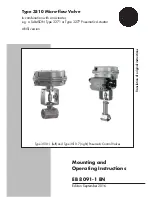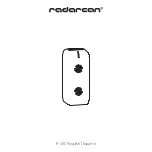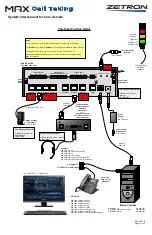
PLEASE READ CAREFULLY BEFORE PROCEEDING
Page
4
/
53
System Manual GEOS12 EN54
GEO Technology is radically new thinking
The GEO R&D Project has, to date, resulted in the following patent applications:
The GEO Hyperboloid Reflective Wavesource™ differs radically from the megaphone-variant type horns you know and love (or
hate). “Tried and true” methods will produce entirely unexpected results. HRW technology produces precise and predictable
results.
The Configurable Directivity Flange. A waveguide that allows the operator to alter its behaviour. An unprecedented NEXO
development that is easy to use
– once you know how and when.
The Phase Directivity Device needs no operator input to function, but it is reassuring to know that the coupling of the midrange
of the system is considered
as important as the high frequencies…
DSP-driven Directional Sub-bass devices are a new approach to controlling LF/VLF acoustic energy.
GEO is not hard to use when you understan
d how…
The technology behind GEO is revolutionary, but it is grounded in years of practical experience with the problems of delivering
high quality professional sound to large audiences at high SPL levels. The GEO toolbox includes NS-1 - a simple yet powerful
and highly predictive design tool. The array assembly system is keyed to the design software and will easily enable you to
deploy your design with great precision. NEXO Digital TDcontroller technology provide driver protection and system optimization
for the GEO S and LS series.
GEO is a high precision system
The GEO HRW™ controls acoustic energy more precisely than other multiple element waveguides. It also makes GEO less
forgiving of mistakes. Whilst conventional horns never combine into a coherent array, they may deliver acceptable results even
if the design and deployment of the system is less than optimal. This is not the case with GEO where careless installation
produces catastrophic results.
A GEO Tangent Array is not a “line array”
GEO Technology is equally effective in designing and deploying tangent curved vertical or horizontal arrays. For best results in
a specific application the user needs to know how multi-speaker arrays interact with audience geometry, along with the benefits
and drawbacks of curved vertical arrays and horizontal arrays.
Curved tangent arrays require different design techniques
In the past, sound reinforcement professionals have worked with horizontal arrays that use conventional horns to deliver [more
or less] ‘equal power to equal
angles
’. Curved vertical arrays are now designed to deliver [more or less] equal power to equal
areas
’. When arrays use conventional horns, the lack of precision, overlap and interference masks errors in array design and
aiming. The highly precise GEO wavesource responds accurately, consistently and predictably to the design and deployment
of a curved vertical tangent array. This is why the GEO rigging system is designed to control angular splay to 0.1° precision.
GEO curved tangent arrays require different operational techniques
Over the years, system designers and operators have developed a number of signal processing techniques to disguise and
partly overcome the limitations of horn design. “Frequency shading,” “amplitude shading,” “High Frequency compensation”, all
of these are tools of the advanced sound system operator. NONE OF THESE TECHNIQUES ARE APPLICABLE TO GEO
TANGENT ARRAYS. Instead of enhancing the array’s performance they will severely degrade it.
Take time to learn how to get great results with GEO Technology. It is an investment that will pay off in more satisfied clients,
more efficient operating procedures and more recognition for your skill as a sound system designer and operator. A
comprehensive understanding of GEO theory, tangent arrays, and specific features of the GEO S Series will help you to operate
your system at its full potential.
Summary of Contents for GEO S12 EN54 Series
Page 34: ...TECHNICAL SPECIFICATIONS Page 34 53 System Manual GEOS12 EN54 9 1 2 Dimensions mm inches ...
Page 36: ...TECHNICAL SPECIFICATIONS Page 36 53 System Manual GEOS12 EN54 9 2 2 Dimensions mm inches ...
Page 38: ...TECHNICAL SPECIFICATIONS Page 38 53 System Manual GEOS12 EN54 9 3 2 Dimensions mm inches ...
Page 40: ...TECHNICAL SPECIFICATIONS Page 40 53 System Manual GEOS12 EN54 9 4 2 Dimensions mm inches ...
Page 52: ...USER NOTES System Manual GEOS12 EN54 Page 52 53 11 USER NOTES ...





































